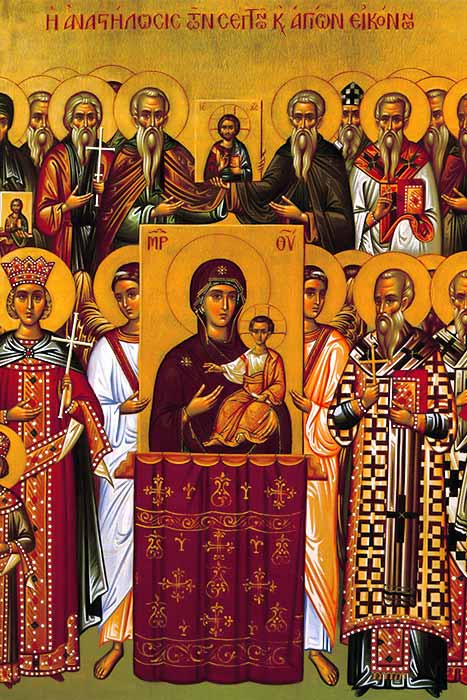Obey your leaders and submit to them; for they are keeping watch over your souls, as men who will have to give account. Let them do this joyfully, and not sadly, for that would be of no advantage to you. Pray for us, for we are sure that we have a clear conscience, desiring to act honorably in all things. I urge you the more earnestly to do this in order that I may be restored to you the sooner. Now may the God of peace who brought again from the dead our Lord Jesus, the great shepherd of the sheep, by the blood of the eternal covenant, equip you with everything good that you may do his will, working in you that which is pleasing in his sight, through Jesus Christ; to whom be glory for ever and ever. Amen.
Hebrews 13: 17-21 (Epistle from Feast of St. Anthony)
The Prayer Team schedule for the next couple of days will be as follows:
- Today, January 16, we will reflect on the feast of St. Anthony (he is commemorated January 17)
- On January 17, we will reflect on the feast of Sts. Athanasios and Cyril (commemorated January 18)
- On January 18-19, we will reflect on the Epistle and Gospel lessons for this Sunday, January 19
Every time I read this passage of Scripture or hear it read in church, it is very personal to me. Nearly every week of my priesthood, someone in the parishes I have served has challenged a decision I have made in a way that is unkind. Sure, as a human being, I have made decisions that in hindsight were not the best decisions. But on the overall, I’d like to believe that the majority of decisions I make are for the good of the flock I serve. I’ve been victim of many varieties of unkindness—I’ve received nasty emails, text messages and phone calls. I’ve been cursed at, had people walk out of my office, and had doors slammed in my face. I’ve also been slandered and gossiped about, and I’ve had lies spread about me.
I believe that the call to the priesthood is a very personal one—it comes with great responsibility, but it also comes with authority. The responsibility is the care for the souls of the flock entrusted to the priest. The authority is to be the leader of the flock. While some may look at the priest as an employee, given that he is paid a salary by the parish, he is the leader of the parish, by virtue of what Jesus says in the Gospels, by virtue of his ordination, and for those who like this sort of thing, by the Uniform Parish Regulations of the Greek Orthodox Archdiocese of America.
The Orthodox Church is a hierarchical church. That means it is led by our hierarchs, our bishops, who are represented on the parish level by priests. When the hierarch speaks, the priests are to be obedient. The priests submit to the authority of the bishop. Why? Because it keeps good order. If everyone has his or her own idea about something, then the church cannot move forward in a united manner. Rather, we unite behind the vision of our bishop. And in like manner, the people are supposed to unite behind the vision of their priest, which reflects the vision of the bishop, which reflects the vision of Christ. Now, bishops and priests are human beings, and they do make mistakes. If a bishop or priest ever told someone to do something immoral or illegal, we should not be obedient to that. But if a bishop asks us to do something that we don’t necessarily agree with, when it is for the good of the church, we should be obedient.
Obedience and submission are usually seen in a negative light in the world today. They seem to be in conflict with freedom. The irony is, that they are not. As an example, we are all obedient to the way we celebrate the Divine Services in our church. We do not express ourselves in unique ways during worship. We celebrate the services in virtually the same way the whole world over. If everyone had his or her own expression of worship, then we would have chaos for one thing and we would lose our identity as Orthodox Christians. We are free in worship because we are obedient to a Tradition and practice of worship. We are to be obedient to a Tradition of canon law—rules that govern our practice of Orthodoxy. Included in the canons are things about fasting, moral living, marriage, and much more. Where would we be in our practice of Orthodox Christianity without these things?
As a priest, I have been entrusted the responsibility for the souls of the people I serve. This is a weighty responsibility. I am supposed to speak and teach in a way that edifies the faithful and furthers the Gospel of Jesus Christ. If, at every corner, I receive discouragement from the people, it will be hard to do this work with joy or confidence. That also doesn’t mean that a priest must be showered with compliments or treated like some kind of guru. Rather, the priest should be respected, and his vision for growing the church should be obeyed. I do have a sense, as we read in Hebrews 13:17, that as a priest, I am someone “who will have to give account” for the souls I have watched over. And as we read in Hebrews 13:17, I (and we clergy) would like to “do this joyfully, and not sadly, for that would be of no advantage to you.”
Hebrews 13:18 implores the people to “pray for us (the church leaders), for we are sure that we have a clear conscience, desiring to act honorably in all things.” No one wants to lead without a clear conscience. No one intentionally does not want to act honorably. I sincerely believe that clergy try to do these things, and in our human frailty, we all miss the mark at times. What we, the clergy, need most is prayer. We need people to pray for us. We need people to encourage us. When people complain to me about their priest (as I’m sure people go to other priests to complain about me), I ask them very quickly “do you ever pray for your priest?” And “When is the last time you encouraged your priest?” It seems that just about always, these two things are not happening with the parishioner who is having acrimony with his or her priest.
I’m sure that this Epistle lesson is very hard to hear for everyone—for clergy and laity alike. Because it indicts not only the laity, but the clergy as well, those who act carelessly, whom the faithful have a difficult time being obedient to. Saint Paul wrote his Epistles in the early years of the church to address problems like this in the early church. We continue to read these Epistles because we face the same problems still in the church today.
Let’s carry this one step further, and talk about “leaders” in general, not just the clergy. There are many leaders to whom we have to submit—parents, doctors, law enforcement officials, etc. Think about how much more smooth things go with these people (and others) when we are obedient. For instance, I go to hockey games occasionally with my son. Large amounts of people walk down the sidewalk in downtown Tampa towards the hockey arena. Police officers stand at every intersection to tell us when it is safe to cross, and when we are to stop so that cars can pass. We are “obedient” to their instructions. When they tell us to walk, we walk. When they tell us to stop, we stop. Our “will” would be to have no stops on our walk and to get to the stadium as soon as possible. However, we “submit” our will to the will of the police officers. Imagine what would happen if we didn’t. We might get hurt or killed by a car. There would be total chaos among pedestrians and vehicles. There would be fear, anger and uncertainty. Instead, everyone passes safely—cars and people—through obedience and submission. In these things, ironically, we find freedom.
On January 17, we celebrate the Feast of St. Anthony, who lived from 251-356. He lived an ascetic life in the desert in Egypt. He was obedient to God’s word, submitting his will and his desires and instead strictly following after God. This brought him a peace and grace that was uncommon for people to have. Many people heard of St. Anthony and came in the desert to receive his blessings and to emulate his grace and his zeal. St. Anthony founded monastic communities and is one of the “fathers” of modern day monasticism. The word “ascetic” means “discipline”. A disciplined life is a life that is obedient to certain principle. A “disciplined” eater will follow/obey a diet. A “disciplined” athlete will be obedient to a workout schedule.
Obedience, submission, discipline and self-control are all related. They are all foundational to true freedom. So pray for your priest and church leaders, pray for all leaders, and strive to live a life of spiritual discipline and self-control, obeying the commandments of God.
Imitating the manners of Elijah the Zealot, and following the straight paths of John the Baptist, O Father Anthony, you colonized the desert, and you supported the Empire by your prayers. Therefore intercede with Christ our God to save our souls. (Apolytkion of St. Anthony, Trans. By Fr. Seraphim Dedes)
Obedience and submission are not bad things. In fact, in spiritual terms, they are great things!

